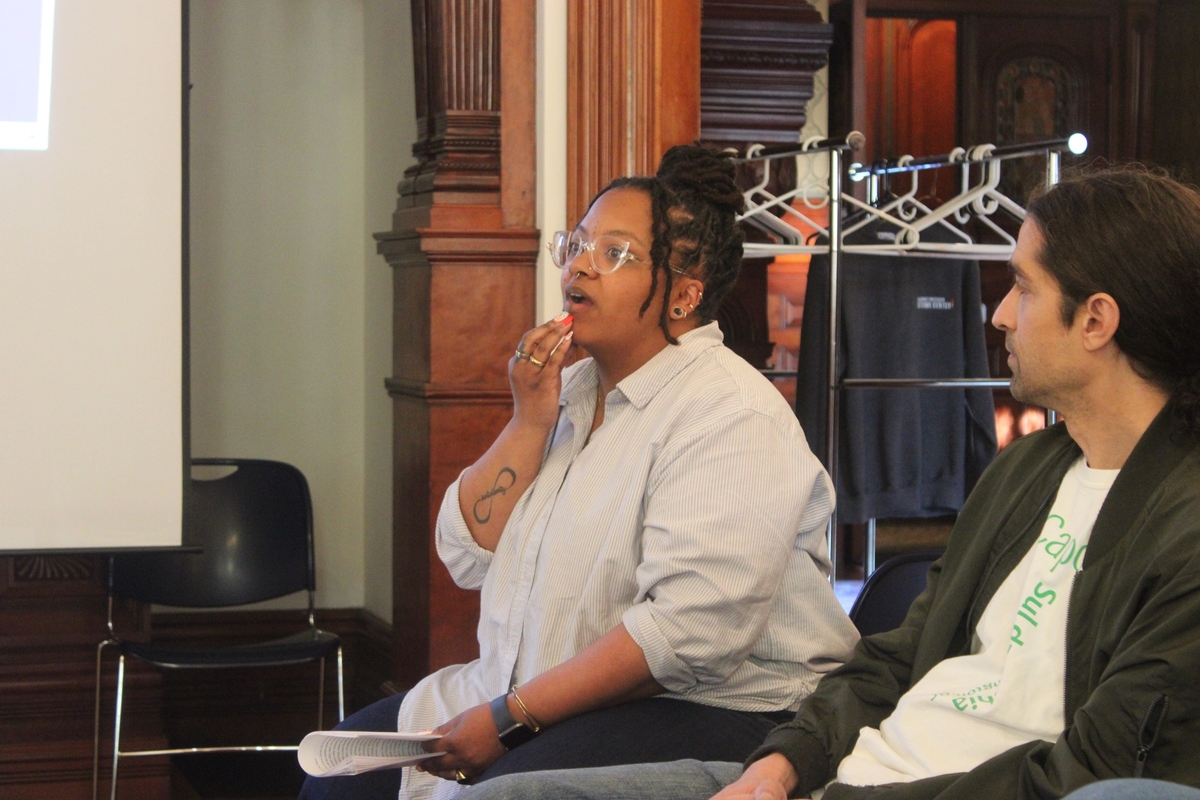Hartford
Booked. What About Books?
by | Apr 26, 2024 11:39 am
Post a Comment | E-mail the Author
Posted to: Books

Jamil Ragland Photo
Erika Slocumb recalls her time as a teacher
Salons at Stowe: Literary Criticism Locked Up
Harriet Beecher Stowe Center
Hartford
April 24, 2014
I went to the Harriet Beecher Stowe Center for a discussion titled “Literary Criticism Locked Up.” The discussion was supposed to focus on the restrictions on literacy for incarcerated people, and the limits placed on telling their stories. As both a writer and former educator, I was greatly anticipating the program.
Cat White, the director of public programs, welcomed us into the Stowe Center. “Stowe believed in the power of words. She was writing to change hearts and minds, because she knew that words matter,” White said.
After she spoke, the man next to me raised his hand.
“Is it OK if I say something?” he said in a Jamaican accent.
His name was Errol Reid, and he shared the fascinating tale of what brought him to the Stowe Center that day.
Errol had come to the United States from Jamaica on a soccer scholarship. He was himself incarcerated in Arizona, sentenced to prison for selling marijuana. During his incarceration, he spent much of his time continuing his studies. He wrote a book.
“My book was a process of sitting with myself to try and understand why I did this,” Errol said. He talked about how his own father spent much of Errol’s childhood incarcerated, and now he had a similar relationship with his own son.
“My son thinks the same things about me that I thought about my father,” he said. It’s a statement that really resonated with me.
There are a lot of things I think about my father, and I wonder if my son thinks those things about me too. It’s one of those questions that parents rarely get a satisfactory answer to.
Errol has refused to let his incarceration deter him, even referring to it as research as he pursues his goals. He’s studying to receive his PhD in education organizational change and leadership at Baylor University. He wants to play a “disruptive” role to improve education.
His mention of educational work piqued the attention of Erika Slocumb, Stowe’s director of interpretation & visitor experience. She, too, is in graduate school. Her research focuses on the treatment of Black boys in K‑12 education. Before joining the Stowe Center, Erika worked in an elementary school in Springfield, where she was shocked and dismayed by what she heard.
“I heard how they talked about Black boys, and I didn’t want that for my son,” she said. I’ve worked in schools for much of my adult life, and have been similarly blown away by the comments I’ve heard from teachers about Black children and their parents.
That’s when another woman in a white shirt jumped in. She shared the story of her son, who has been in and out of prison for the last 20 years. He’s currently awaiting sentencing. That has left him in educational limbo. Since he hasn’t been sentenced yet, he can’t use the library or enroll in any of the educational programs his facility offers. He’s been unable to access those resources for over a year.
“There is such a struggle to have a sense of grace about other people,” she said. “Everything is about punishment.”
The evening went on in that way, as people shared their own experiences with literacy, education and incarceration. We never got back to the program for the evening, but I think we ended up in a better place. It was a place where people could discuss what has shaped them and their families. If only every discussion could be so illuminating.

The woman in the white shirt discusses her son's difficulty accessing educational resources while incarcerated.
NEXT
The Stowe Center hosts the next Social Justice Reading Circle on May 8.
Jamil goes to the circus!